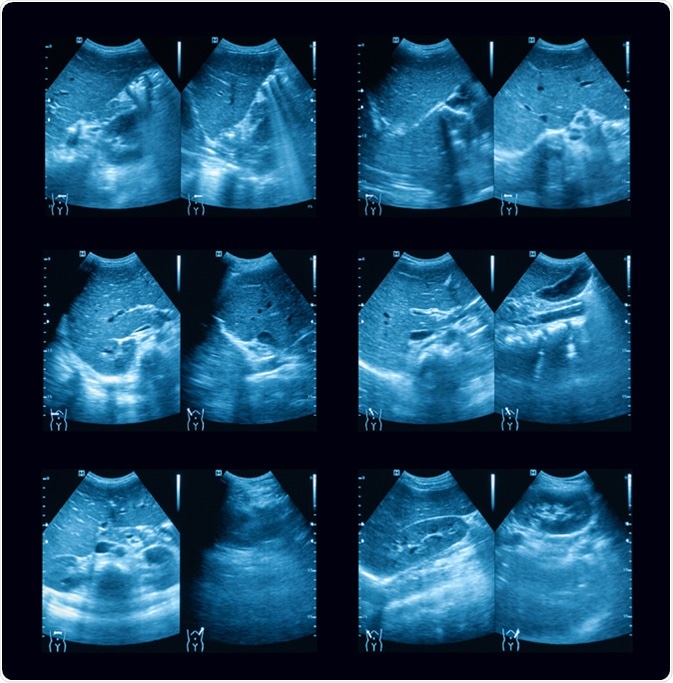Splenectomy is the procedure performed to remove the spleen. It may be done for various indications, some of which are detailed below:
Indications
- Hematologic:
- For the treatment of any disease in which blood cells are sequestered in the spleen and destroyed too rapidly
- To prevent hypersplenism due to splenomegaly
- To assess the stage of Hodgkin’s disease
- To diagnose the reason for splenomegaly when the blood picture is not clear
- Traumatic damage to the spleen
- Spleen enlargement due to disease
- Splenic involvement in cancer
- Treatment of hypersplenism
In most situations, total splenectomy is the rule. Partial splenectomy is performed only in certain specific conditions such as Gaucher’s disease, to preserve some splenic function while preventing hypersplenism.

Ultrasound of upper abdomen, post splenectomy, a 16 young Asian boy - Image Credit: Suttha Burawonk / Shutterstock
Types of splenectomy
Splenectomy is performed in different ways:
- Open splenectomy using a midline or subcostal incision, depending on the need of the surgeon’s need for exposure of the organ, and the etiology.
- Partial splenectomy refers to removal of part of the spleen, and is usually done to relieve splenic enlargement in Gaucher’s disease, or for the sake of a biopsy.
- Laparoscopic splenectomy is performed best for spleens enlarged to less than 20 cm, with less complications than for the equivalent open procedure. It requires more technical skill and operative facilities.
Consequences of splenectomy
The spleen plays various roles in immunity and red cell recycling. As a result, splenectomy impairs the immune response. Though the body is in most cases able to defend itself against most infections, sometimes bacteria may get the upper hand very quickly and threaten life. This risk is more in children, but still accounts for only a small part of most infections.
For this reason, patients who are about to have a splenectomy should receive elective immunization with pneumococcus vaccine from one week before the surgery at latest, to three weeks before, which is ideal. If not, the vaccine should be given two weeks after splenectomy if the patient is otherwise healthy.
Follow-up after splenectomy
Every patient should carry a reminder medical bracelet, card, or necklace to inform others that they do not have a spleen, in case of emergency. They should also remind all health practitioners of the fact before receiving any treatment. All routine immunizations should be up to date and additional pneumococcal, Hemophilus influenza type B, and meningococcus type C vaccines should be administered annually.
Prophylactic antibiotics are usually prescribed for the first few years following the surgery, and for all patients younger than 16 years of age until this date. Some physicians prefer to reserve antibiotics for use at home in case of illness if urgent medical consultation is not possible. All possibly infectious diseases should be dealt with adequately and immediately.
Full protection should be adopted against outdoor exposures to tick bites, and if any such event is suspected, rapid treatment should be sought. Special precautions may also become necessary before planning foreign travel, including prophylactic antimalarials, extra vaccinations against endemic infections, and an antibiotic kit for travel use.
References
Further Reading
Last Updated: Mar 7, 2019